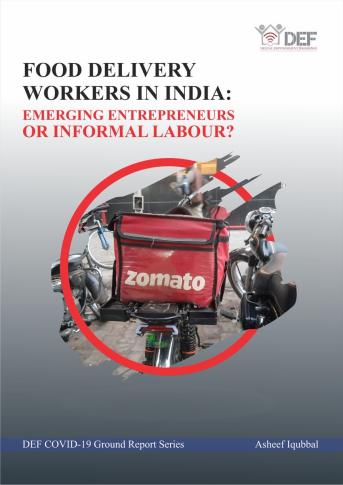
This publication is part of the DEF COVID-19 Ground Report Series, collection of in-depth ground reports by the research team of Digital Empowerment Foundation. They have been collecting localised information about the masses and how they are impacted through various situations emerging because of the pandemic.
Digital Empowerment Foundation has been intensely working across India with a digital infrastructure across 100 locations. During COVID-19, DEF has a privileged position to be present diversely which helped in bringing a series of ground reports.
New Delhi: A delivery worker with Zomato, Anand Kumar is frequently checking his phone at Malviya Nagar market in the hope that he will receive a new order. He had logged in at 10:40 in the morning, and received only 4 delivery orders till 4.30 in the evening, and earned only a total of 80 rupees. Anand is among millions of workers who work for the food delivery platforms such as Zomato and Swiggy. In the recent past, food delivery services have emerged as key employers in the urban and peri-urban areas. These platforms facilitate the delivery of food from restaurants to customers, through a fleet of delivery workers. Having a motorbike/bicycle and a smartphone with an active Internet are the necessary requirements for this job. This seems straightforward and convenient for everyone except those who make the business possible — delivery workers [Riders].
Delivery workers in India are generally paid per delivery. Food delivery platforms term the delivery worker “independent contractors’’ or “delivery partners’’. Delivery workers are not considered traditional “employees”. Consequently, these workers do not benefit from labour rights relating to pay, working hours, working conditions and collective bargaining rights which are emblematic of the informal workforce in India. The deep seated issues prevalent within the informal workforce stand to be aggravated within the platforms. Informalisation of the workforce has a long history in India. In 1991, Indian government opened up the economy to achieve a higher growth rate and to generate more formal jobs, since then only 61 million jobs have been created out of which 92 percent jobs have been in the informal sector.
During the interviews with food delivery workers of Swiggy and Zomato in New Delhi, it was found that many of them were migrants to the city and are dependent on incentives for their survival, since the basic income in itself does not suffice. But to earn incentives these workers have to often spend 12 hours on the jobs.